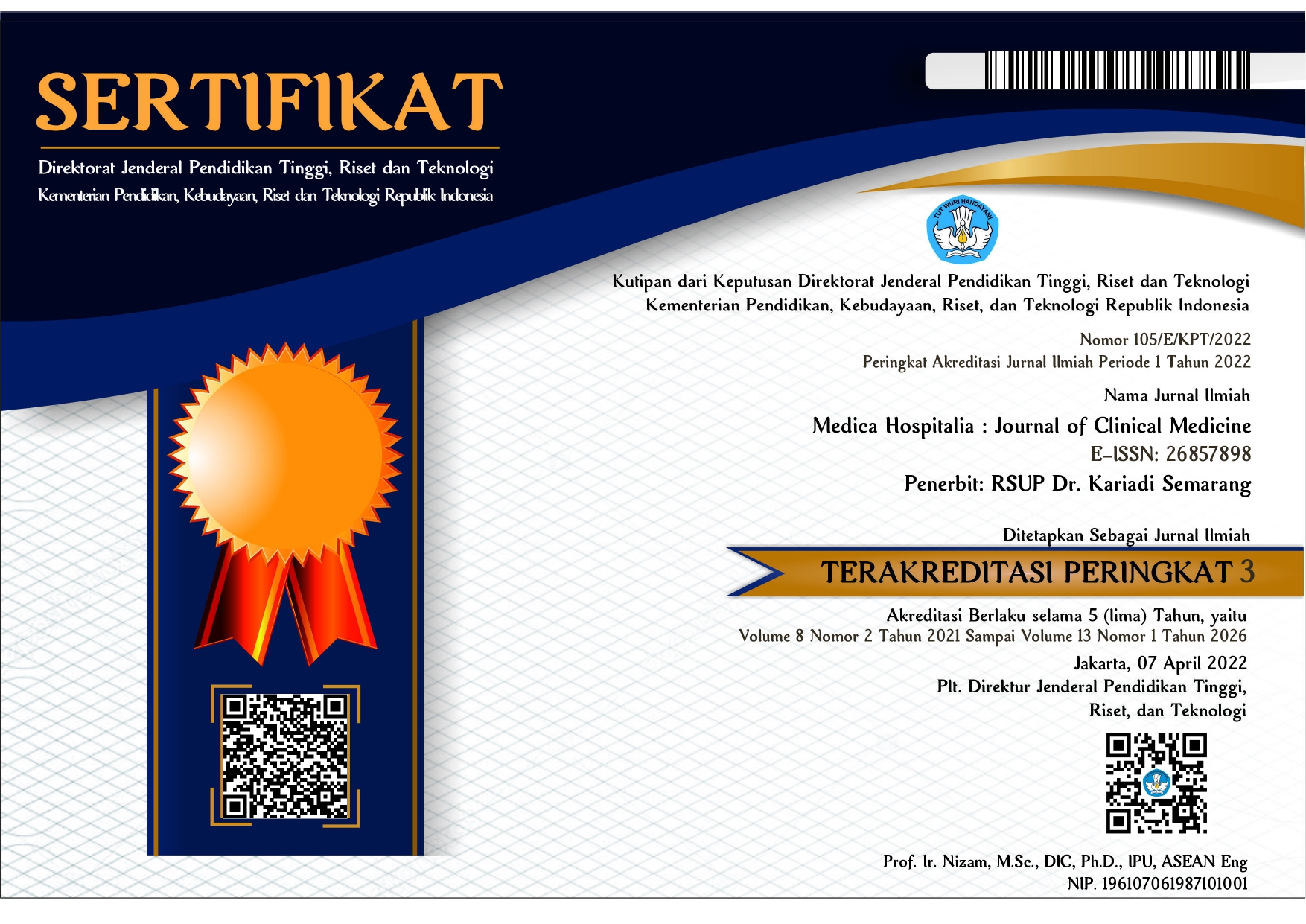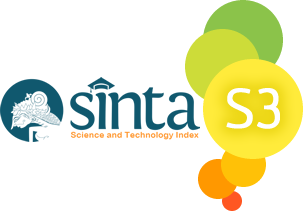The Relationship Between Serum Folic Acid Levels With The Cognitive Function of The Elderly
DOI:
https://doi.org/10.36408/mhjcm.v10i2.891Keywords:
Cognitive function, MoCA-INA, Serum Folic Acid LevelsAbstract
Background: Cognitive decline is a common condition that occurs in the elderly. One of the early indicators of senility is a decrease in cognitive function. Folic acid is thought to protect the arteries from damage because of homocysteine by converting homocysteine into cysteine and then excreted in the urine. Increased levels of homocysteine can interfere with vascular function and cause toxic effects on neurons thereby increasing the risk of cognitive decline.
Objective: To determine the relationship between serum folic acid levels and cognitive function of the elderly.
Method: Analytical descriptive research with a cross-sectional approach. The research subjects were the elderly who met the inclusion criteria and did not have exclusion criteria. The research was conducted from May to July 2022 at the Pucang Gading Nursing Home, Semarang. Serum folic acid levels were examined using the ELISA (Enzyme-linked immunosorbent assay) method. Cognitive function was assessed using the Indonesian version of the Montreal Cognitive Assessment (MoCA) simultaneously on the subject. Cognitive function is normal if the MoCA-INA value is ≥ 26 and it is said to be cognitive dysfunction if the MoCA-INA value is < 26. Data were analyzed using the Spearman test. Results are considered significant if the value of p <0.05.
Result: There is a strong positive correlation between serum folic acid levels and cognitive function in the elderly (r=0.914, p<0.001). There is a relationship between educational level and cognitive function (r=0.922, p<0.001) where higher education correlates with increased cognitive function in the elderly.
Conclusion: There is a significant positive correlation between serum folic acid levels and cognitive function in the elderly
Downloads
References
1. Departemen Kesehatan RI. Riset Kesehatan Dasar: Badan Penelitian dan Pengembangan Kesehatan Kementrian, 2013.
2. Badan Pusat Statistika. Statistik Penduduk Lanjut Usia. 2014. Available at : https://www.bps.go.id/index.php/publikasi/1117. [Accessed : April 3rd 2021]
3. Lit-Fui Lau MA. Alzheimer’s Disease. Lau, Lit-Fui, Brodney MA, editor. Berlin Heidelberg; 2008.
4. Sinambela MP. Hubungan Asupan Zat Gizi (Protein, Vitamin A, Asam Folat, Vitamin B12, dan Vitamin C) dan Fungsi Kognitif pada Lansia di Panti Werdha Wisma Mulia Kowani Jakarta Barat Tahun 2018. Jakarta: Fakultas Ilmu Kesehatan Universitas Esa Unggul, 2018.
5. Reynolds, E. H. The neurology of folic acid deficiency. Handb. Clin. Neurol. 120, 927–943 (2014).
6. Morris, M. S. & Jacques, P. F. Folate and neurological function: Epidemiological perspective. Folate Heal. Dis. Second Ed. 325–353 (2009).
7. Baroni, L., Bonetto, C., Rizzo, G., Bertola, C.,Caberlotto, L., & Bazzerla, G. Association between Cognitive Impairment and Vitamin B12, Folate, and Homocysteine Status in Elderly Adults: A Retrospective Study. J.Alzheimer’s Dis. 70, 441–451 (2019).
8. Murman DL. The Impact of Age on Cognition. Semin Hear. 2015 Aug;36(3):111-21. doi: 10.1055/s-0035-1555115. PMID: 27516712; PMCID: PMC4906299.
9. Salthouse T. Consequences of age-related cognitive declines. Annu Rev Psychol. 2012;63:201-26. doi: 10.1146/annurev-psych-120710-100328. Epub 2011 Jul 5. PMID: 21740223; PMCID: PMC3632788.
10. Rambe AS, Fitri FI. Correlation between the Montreal Cognitive Assessment Indonesian Version (Moca-INA) and the Mini-Mental State Examination (MMSE) in Elderly. Open Access Maced J Med Sci. 2017 Nov 25;5(7):915-919. doi: 10.3889/oamjms.2017.202. PMID: 29362618; PMCID: PMC5771294.
11. Husein, N., Silvia, L., Yetty, R. dan Herqutanto. 2010. Uji Validitas dan Reabilitas Montreal Cognitive Assessment Versi Indonesia (MoCA- Ina) Untuk Skrining Gangguan Fungsi Kognitif. Neurona Neuro Sains. 27(4): 15-22.
12. Husein N, Luwempouw S, Ramli Y. Uji validitasdan reliabilitas montreal cognitive assesment versi Indonesia (MoCA-Ina) untuk skrining gangguan fungsi kognitif. Medical Research Unit Medical Faculty University of Indonesia (serial online) 2009.
13. Li M, Li W, Gao Y, Chen Y, Bai D, Weng J, Du Y, Ma F, Wang X, Liu H, Huang G. Effect of folic acid combined with docosahexaenoic acid intervention on mild cognitive impairment in elderly: a randomized double-blind, placebo-controlled trial. Eur J Nutr. 2021 Jun;60(4):1795-1808. doi: 10.1007/s00394-020-02373-3. Epub 2020 Aug 28. PMID: 32856190.A.Laksmidewi
14. Yao, S. Zeng, H., Sun, S. Investigation on status and influential factors of cognitive function of the community-dwelling elderly in Changsha City. Archives of gerontology and geriatrics. 2009. 49(3), 329-334
15. Singh-Manoux A, Czernichow S, Elbaz A, Dugravot A, Sabia S, Hagger-Johnson G, et al. Obesity phenotypes in midlife and cognition in early old age The Whitehall II cohort study. Neurologi. 2012. 79(8):755-62
16. van Vliet P. Cholesterol and late-life cognitive decline. J Alzheimers Dis. 2012;30 Suppl 2:S147-62. doi: 10.3233/JAD-2011-111028. PMID: 22269162.
Additional Files
Published
How to Cite
Issue
Section
Citation Check
License
Copyright (c) 2023 Hermanto Hermanto, Hexanto Muhartomo, Amin Husni, Maria Immaculata Widiastuty, Herlina Suryawati, Arinta Puspita Wati

This work is licensed under a Creative Commons Attribution-ShareAlike 4.0 International License.
Copyrights Notice
Copyrights:
Researchers publishing manuscrips at Medica Hospitalis: Journal of Clinical Medicine agree with regulations as follow:
Copyrights of each article belong to researchers, and it is likewise the patent rights
Researchers admit that Medica Hospitalia: Journal of Clinical Medicine has the right of first publication
Researchers may submit manuscripts separately, manage non exclusive distribution of published manuscripts into other versions (such as: being sent to researchers’ institutional repository, publication in the books, etc), admitting that manuscripts have been firstly published at Medica Hospitalia: Journal of Clinical Medicine
License:
Medica Hospitalia: Journal of Clinical Medicine is disseminated based on provisions of Creative Common Attribution-Share Alike 4.0 Internasional It allows individuals to duplicate and disseminate manuscripts in any formats, to alter, compose and make derivatives of manuscripts for any purpose. You are not allowed to use manuscripts for commercial purposes. You should properly acknowledge, reference links, and state that alterations have been made. You can do so in proper ways, but it does not hint that the licensors support you or your usage.

























